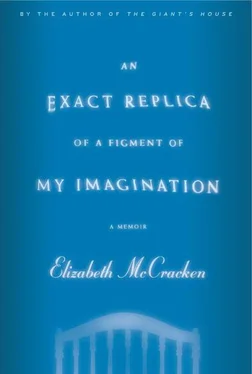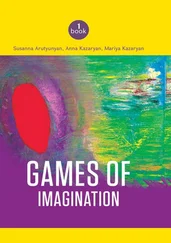And with that it was easy to start buying clothing, and easy to start a memoir all about my happy, uneventful pregnancy. Easy to thumb my nose at the evil eye. We knocked on wood and made wishes, but by eight months all the wishes I made were like a smug joke I had with myself. I knocked wood and I wished on stars, but sometimes there was something else to wish for, something that hadn’t already been taken care of, and so I did.
I just thought he was a sure thing.
I wrote about our doctors, my search for a gym in the French countryside, what we ate, our friends down the road. It would make a good book, I thought: I’d end it with the three of us leaving France together. I tried not to write sentences that made it sound as though he were already born and things were fine, because I wasn’t willing to tempt the evil eye that much. Eventually I wrote 170 pages. They’re still somewhere on my computer.
That’s another reason I wrote down, This is the happiest story in the world with the saddest ending: I was in the habit of narrating my daily life.
I didn’t write a single word of this second book during my second pregnancy.
Here’s what else we didn’t do when I was pregnant the second time.
Knock wood. Light candles. Tell ninety percent of the people we knew that I was pregnant. Have an amniocentesis. Pick up pennies. Wish on: stars, white horses, alarm clocks reading 11:11, wishbones, blown dandelion fluff. Buy baby clothes. Pick names. Find out the baby’s gender. Come up with an in utero name: the kid was “the kid” or “whoever it is” or merely the unspoken result of “if everything goes right.” Begin sentences, “After the baby’s born. .” Toss spilled salt over left shoulders. Give a fuck about the number thirteen no matter where it showed up.
No matter how much we wanted to.
I can’t remember how long we’d known that Pudding was dead before we declared that we would have another child, or which one of us first said it. Certainly it was within minutes of hearing the bad news, and we both kept repeating it, not because we were done with this baby, but because that sentence — we’ll have another child, we’ll have another child — was like throwing out a towline. It was like believing in the future instead of in the place we were at that moment. We vowed to try as soon as possible.
“But not in August,” I said after a while. August was when Pudding was conceived. August meant an April or May baby. That seemed like too much.
And then we left France, and I decided to be practical about everything. I was thirty-nine, I wasn’t going to toss away a whole month like that. Anyhow, what were the chances? How could we count on anything?
So I couldn’t say, We will have another child. Instead, I said, “I hope we can have another child.” It was bad enough grieving for this child, my Pudding, without lamenting other only theoretical children. I missed the child we lost and I wanted another and these seemed like two absolutely separate aches.
He was a person. I missed him like a person. Seeing babies on the street did not stab me with pain the way I know they stab some grieving women, those who have lost children or simply desperately want to have them. For me, other babies were other babies. They weren’t who I was missing. Every now and then a baby could take me by surprise and make me weep — for instance, an e-mailed photo of my cousin Rosalie’s son, who (I realized as I stared at it, and closed the file, and opened it up again) looked like I’d imagined Pudding, though as it happened we shared none of the same blood. Babies born to mothers who’d been pregnant at the same time as me hurt a little. I didn’t mind hearing about them, but I didn’t want to meet them. That puzzled me since it wasn’t logical, and even in mourning I liked to think I was logical, but it was an unhappiness that rose up in me, even months later when I was already pregnant though not broadcasting it, and I saw a friend who’d had a baby three months after me, a wonderful woman who — because she had just become a mother — was so sympathetic and sweet to me. Most people didn’t even mention Pudding; she enfolded me in a hug and said, “Oh, Elizabeth, I am so sorry about your baby” — and I just wanted her to leave, because I didn’t want to be a good and decent and functioning human being and ask after her baby. Even now I have a hard time with the babies born to friends around Pudding’s birth. It’s not logical, and yet there it is: this one is one month older, this one three weeks younger.
But mostly I just missed my own child.
About a week after Pudding’s death I got in my e-mail box a photograph of the newborn son of a very lovely woman who’d been a student of mine at Iowa. She’d known I was pregnant, but her friends had very wisely kept silent about what had happened, so as not to terrify her, and therefore her husband didn’t know he shouldn’t send me a photograph of a newborn baby boy. A few weeks later, and it would have been fine: by then, when friends reported that someone I knew had had a baby, they usually added, “I didn’t know whether to tell you or not, but I figure. .”
“Oh,” I always said, “if human reproduction has to carry on, I want it to work out for people I like.”
Still, I wouldn’t have minded a pause in the whole business. A sudden harmless moratorium on babies being born. Doctors would have to tell the unfortunate pregnant, “I’m sorry. It happens sometimes. Tidal, we think. For everyone else, nine months, but for you, eleven months, maybe a year, maybe more. Don’t go outside. Don’t leave your house. Stroke your stomach, fine, but only in your own living room. Keep your lullabies to yourself. We’ll let you know when it’s time.”
That lovely former student sent a horrified apology when she found out what had happened, but of course I understood. That is one of the strangest side effects of the whole story. I am that thing worse than a cautionary tale: I am a horror story, an example of something terrible going wrong when you least expect it, and for no good reason, a story to be kept from pregnant women, a story so grim and lessonless it’s better not to think about at all.
Where in France did we live? In the middle of the southwest of the country. In an area called Aquitaine. In a department called Lot-et-Garonne. Forty-five minutes southwest of Cyrano’s Bergerac. Forty minutes east of the tower where Montaigne wrote for the last years of his life. Our address was in the village of Baleyssagues, but the closest place to buy bread and wine and cheese was Duras: three bakeries, a post office, two bars, two pharmacies; Marguerite Duras took her pen name from the town, which is where her father was buried (though not where her own first child, a son, was stillborn in 1942). The nearest train station was in Sainte Foy la Grand. We were, of course, an hour east of Bordeaux.
My friend Lib has a French friend who lives in Cambridge, Massachusetts, who lost a baby to sudden infant death syndrome. When she found out about Pudding, she said, sadly, “Now France will be ruined for them.” America had been ruined for her, but that loss meant nothing compared to the loss of her daughter. But to lose France, as she knew we would, to lose both France and a child —
It’s a part of the world I will never, ever, ever go back to.
Pregnant with Pudding, I wanted things simple, easy, low intervention. (For my second child I would have agreed to anything, a simultaneous caesarean/ induction/being-pounded-on-the-back-like-a-ketchup-bottle/forceps/extra-drugs/extra-pain delivery.) My first obstetrician was a blond woman from Baltimore who practiced at the upscale American Hospital of Paris. I chose her after looking at the hospital Web site. I wanted a female doctor, and the only other choice was a very glamorous Frenchwoman whose photo seemed to have been taken at sunrise outside a disco.
Читать дальше












